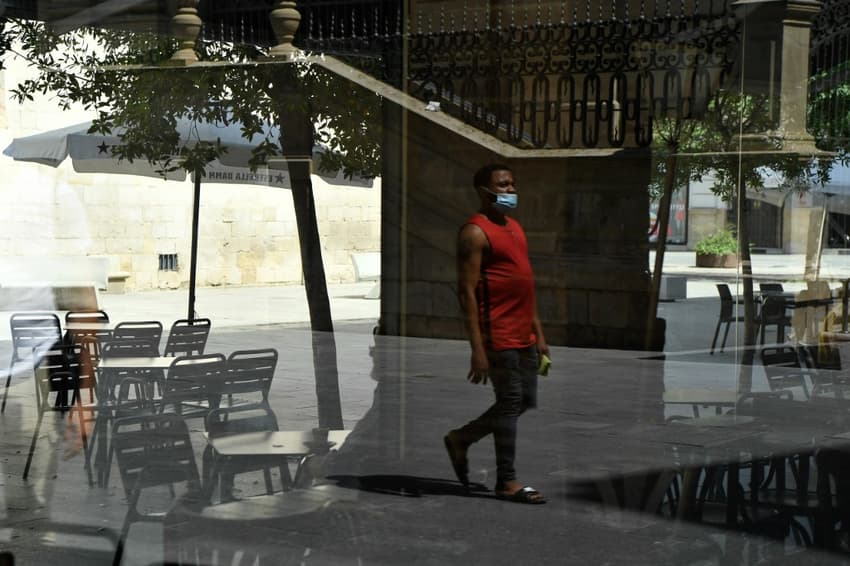Catalonia orders lockdown for 160,000 residents after surge in new Covid-19 cases

About 160,000 people in Catalonia returned to home confinement on Wednesday as authorities tried to control a fresh surge in coronavirus infections in the area. The region saw nearly 1,000 cases in the previous 24 hours.
Catalonia, which registered three deaths and 938 new cases of coronavirus in the past 24 hours, was at the centre of a new surge in outbreaks across Spain.
There were 250 cases in the city of Barcelona on Wednesday, 144 more than the day before.
After days of legal wrangling and political tensions over the issue, a judge finally approved the regional government's order to stay at home in the city of Lleida and six nearby towns in the west of the region on Tuesday night.
Under the new rules, people may only leave their homes for essential activities like working or buying supplies, while hotels, restaurants and bars will close except for food pick-up or delivery.
The regional government is refusing to use the term lockdown given that the measures are not as restrictive as those imposed months ago by the central government at the height of the country's outbreak.
"People can go for a walk and exercise and all the shops will be open," Catalan government spokeswoman Meritxell Budo said on Tuesday.
Moves to reconfine the local population to their homes triggered a legal standoff on Monday when a local court blocked the new lockdown order, prompting the regional government to enact legislative changes.
In the end, the court agreed overnight to allow the measure for 15 days while demanding that the regional authorities provide regular updates on the status of the outbreak.
Catalan authorities are also watching other pockets of infection in this wealthy northeastern region, notably advising that the residents of three districts of Hospitalet de Llobregat -- a city with 260,000 residents -- only leave home for urgent necessities.
Spain, one of the worst-hit nations in Europe by COVID-19, has seen more than 28,000 deaths from the pandemic.
Since the government ended lockdown on 21 June, there has been a surge in coronavirus cases, with 170 clusters of infections across the country, prompting regional authorities to impose a patchwork of local lockdowns and restrictions.
In many cases, these restrictions have confused local people and angered businesses.
Comments
See Also
Catalonia, which registered three deaths and 938 new cases of coronavirus in the past 24 hours, was at the centre of a new surge in outbreaks across Spain.
There were 250 cases in the city of Barcelona on Wednesday, 144 more than the day before.
After days of legal wrangling and political tensions over the issue, a judge finally approved the regional government's order to stay at home in the city of Lleida and six nearby towns in the west of the region on Tuesday night.
Under the new rules, people may only leave their homes for essential activities like working or buying supplies, while hotels, restaurants and bars will close except for food pick-up or delivery.
The regional government is refusing to use the term lockdown given that the measures are not as restrictive as those imposed months ago by the central government at the height of the country's outbreak.
"People can go for a walk and exercise and all the shops will be open," Catalan government spokeswoman Meritxell Budo said on Tuesday.
Moves to reconfine the local population to their homes triggered a legal standoff on Monday when a local court blocked the new lockdown order, prompting the regional government to enact legislative changes.
In the end, the court agreed overnight to allow the measure for 15 days while demanding that the regional authorities provide regular updates on the status of the outbreak.
Catalan authorities are also watching other pockets of infection in this wealthy northeastern region, notably advising that the residents of three districts of Hospitalet de Llobregat -- a city with 260,000 residents -- only leave home for urgent necessities.
Spain, one of the worst-hit nations in Europe by COVID-19, has seen more than 28,000 deaths from the pandemic.
Since the government ended lockdown on 21 June, there has been a surge in coronavirus cases, with 170 clusters of infections across the country, prompting regional authorities to impose a patchwork of local lockdowns and restrictions.
In many cases, these restrictions have confused local people and angered businesses.
Join the conversation in our comments section below. Share your own views and experience and if you have a question or suggestion for our journalists then email us at [email protected].
Please keep comments civil, constructive and on topic – and make sure to read our terms of use before getting involved.
Please log in here to leave a comment.